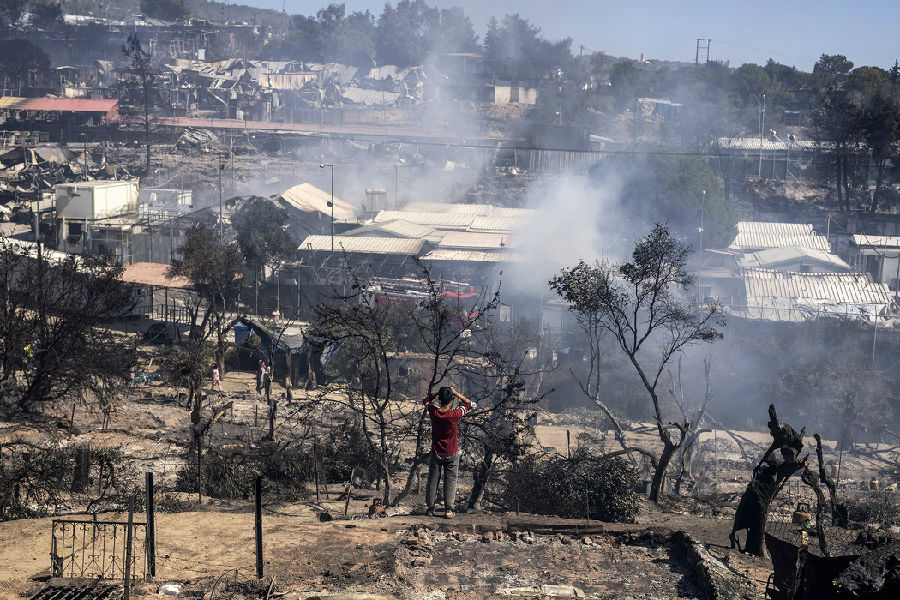JUDY WOODRUFF: Fire ripped through the Moria refugee camp on the Greek island of Lesbos last night and reignited today. The camp was overcrowded and unsanitary, but it was the only place its thousands of inhabitants called home. Special correspondent Malcolm Brabant visited Moria earlier this year and has this report.
MALCOLM BRABANT: Along with his fellow asylum seekers, Fahim Ibrahimi from Afghanistan lost everything in the flames.
FAHIM IBRAHIMI, Afghani Migrant: My house is finished. All fires is many, all finished.
MALCOLM BRABANT: Moria was Europe's largest and most notorious refugee camp. It was supposed to house 2,000, but 13,000 lived in squalid conditions in and outsid the barbed wire. Now they are all more destitute than ever.
CORNILLE NDAMA, Congolese Migrant: Our house is vanished. Our food is vanished. Everything. Our money is gone. We don't know what is going to happen.
GOHARI MOUSHTABA, Iranian Migrant (through translator): Now we will sleep on the street. What can we do? We don't have food. We don't anything. What can we do?

MALCOLM BRABANT: Morning revealed the true extent of this catastrophe. The fire began after midnight, when a group protested against new coronavirus restrictions. So far, 35 migrants have tested positive for COVID. They were obliged to isolate and there were fears that other migrants could end up in detention.
SALAM ALDEEN, Founder, Team Humanity: They thought, OK, everything is a mess right now. They wanted to put us all in jail, all of us, the camp. They want to put a fence around. We don't want to be there, and they start burning things. And I think, though, it started maybe with one fire, and it went crazy. People just got enough.
MALCOLM BRABANT: Salam Aldeen runs a nonprofit called Team Humanity that helps Moria's occupants. Aldeen says his volunteers went into the camp to help save people. So far, no deaths have been reported. There was anger that police stopped the refugees from reaching nearby Mytilini. The Greeks have effectively placed the camp in quarantine because they don't want the virus spreading.
SALAM ALDEEN: The police have blocked the road, the entry, actually the road to the city. They blocked it in front of my center. They don't want the refugees to go there.
MALCOLM BRABANT: The relationship between islanders and refugees has frequently been fractious. There's been a campaign to remove the asylum seekers to the mainland. The conditions in Moria have consistently been condemned as inhumane. Greece has long complained that it is unable to cope with tens of thousands of asylum seekers, some of whom have been stuck in the country for years. It has appealed for international help after the fire. And Germany has responded.
STEVE ALTER, Spokesperson, German Interior Ministry (through translator): Now is the time to define together with the Greeks what kind of help is needed. We will then evaluate this request and then assist quickly and straightforwardly. We have helped Greece many times in the past, and, of course, we will do so now.
MALCOLM BRABANT: This disaster has exacerbated tensions between the islanders and their unwanted neighbors. The U.N. Refugee Agency has appealed to the migrants to stay close to the remains of the camp, while efforts are made to find them new accommodation. For the PBS NewsHour, I'm Malcolm Brabant.













